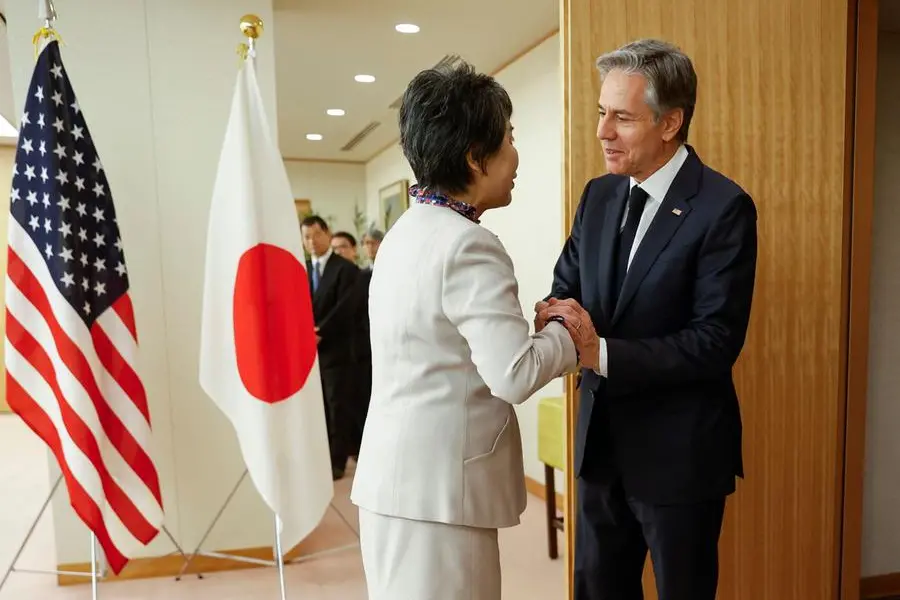PHOTO
US Secretary of State Antony Blinken arrived in Japan on Tuesday for a meeting of G7 foreign ministers set to seek a common line on Gaza as calls mount for a ceasefire in the Israel-Hamas war.
Arriving for two days of discussions in Tokyo following his latest whirlwind tour of the Middle East, Blinken was set to "brief his counterparts on his trip... and progress on delivering humanitarian assistance to civilians in Gaza and efforts to contain the conflict," a senior State Department official said.
The Israeli military has relentlessly bombarded Gaza since October 7, when Hamas militants launched an attack that left 1,400 dead in Israel, most of them civilians, according to Israeli authorities.
The Hamas-run health ministry said the death toll in Gaza has surpassed 10,000 people - including more than 4,000 children.
A key ally of Israel, the United States has resisted calling for a ceasefire, insisting that Israel has the right to respond -- though Washington has called for pauses in the fighting.
In Turkey on Monday, Blinken said Washington was working "very aggressively" to expand aid for trapped civilians.
"I think we will see in the days ahead that the assistance can expand in significant ways," Blinken added, without providing details.
US President Joe Biden and Israel's Prime Minister Benjamin Netanyahu on Monday discussed potential "tactical pauses," the White House said. But no agreements were announced and the pair did not broach the possibility of a ceasefire.
On Monday, Netanyahu said the war would continue until Israel had restored "overall security" control of Gaza.
France was the only G7 member to vote in favour of a UN General Assembly resolution last month seeking an immediate "humanitarian truce".
The United States voted against it while Japan, Britain, Italy, Germany and Canada all abstained.
France said in a statement announcing Foreign Minister Catherine Colonna's attendance in Tokyo that the meeting would discuss "the need to respond to the needs of civilian populations in Gaza and to respect international humanitarian law."
Colonna "will reiterate our condemnation of the terrorist actions of Hamas and the imperative of releasing the hostages," the statement added.
German counterpart Annalena Baerbock said the G7 would "discuss how we can achieve humanitarian pauses together to alleviate the suffering of the people in Gaza."
"For me it is clear that the Hamas terrorists have brought infinite suffering to Israel and the Palestinian civilian population in Gaza with the horrific attacks of October 7. Hamas cannot be allowed to determine the fate of the people in the Gaza Strip," she added.
Valerie Niquet from the Foundation for Strategic Research (FRS) told AFP that any joint G7 call for a humanitarian truce would be "without binding language and in general terms".
Ukraine war
Another major topic at will be the Ukraine war, with Foreign Minister Dmytro Kuleba set to join by video conference.
With some signs of fatigue in supporting Ukraine's war effort against Russia, the G7 was expected to stick to firm language condemning Moscow, experts said.
"The G7 has... been in the vanguard of the West's economic statecraft with regard to Russia since its invasion of Ukraine. I would expect the ministers' meeting to continue to voice support for this," Robert Ward from the International Institute for Strategic Studies (IISS) told AFP.
Analysts said however that the G7 might moderate its language regarding China as tentative signs emerge that Beijing's tensions with the West may be easing.
These include upcoming talks between the United States and China ahead of the COP28 climate conference and President Xi Jinping's scheduled meeting with Biden in San Francisco.
Another G7 topic will be deepening ties with resource-rich and strategically located Central Asia, with foreign ministers from the region set to join by video conference.





















